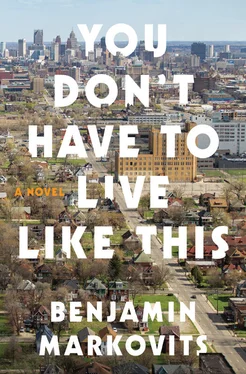In the morning, I checked the Free Press website for news about Meacher, but there wasn’t much. Then I started googling around. I found something on the Voice of Detroit , an “independent” news site set up by ex— Free Press journalists, former city administrators, union organizers, etc. A lot of their content came from citizen reportage. They ran a story about Larry Oh and Robert James. Apparently these two had had lunch together over the weekend, at Zingerman’s Deli in Ann Arbor. Some law student took a picture of them on his phone and wrote it up for the VoD . (One of the comments asked, “So what did they order?” It turns out that Robert had a “Dinty Moore.”)
I also found an op-ed piece in The New York Times about the history of the citizen’s arrest. The byline said Anthony Carnesecca. This is how it finished:
Let’s imagine that Tyler Waites intended to impede Dwayne Meacher, even at the cost of running into him. Could this constitute a justifiable arrest under Michigan law? Arrest is defined as the “stopping or restraint of a person,” and the law establishes three conditions for the just use of this power: that a felony has actually occurred; that the fleeing suspect against whom force is used must be the person who committed the felony; and that the use of force must be necessary to ensure his apprehension. In Waites’s case, all of these conditions have been met. In a city like Detroit, whose tax base has been decimated by population flight, taking the law into your own hands is not just a phrase from some Lee Van Cleef movie, but a necessary feature of a citizen’s obligations, to himself and his neighbors. You may not like it, but you don’t live in Detroit.
About an hour later, Tony himself stopped by. He had his Number One son with him, as my father used to call it. Michael stood a little behind his dad and tried to reach a hand into his pocket. If I didn’t see him every couple of weeks he turned shy with me. Relations with kids take work, I had to keep starting over.
“Is it too early for a treat?” I said to Tony. “I don’t know what I’ve got in the house. Maybe ice cream in the freezer.”
It was already about eighty-five degrees outside, and the shade of the porch didn’t make any difference. The sun couldn’t beat the clouds but the heat got through anyway, a kind of damp heat. I was tempted to switch on the AC just to clear the air.
“Let me take you to lunch,” Tony said. “I want to celebrate.”
“I saw your piece in the Times .”
“That’s what I mean, I’m in a good mood.”
But it was only eleven a.m. and we swung by Robert’s house on the way. “I’m touching all the bases,” Tony said. We took his car, I didn’t have anything else to do. I said to myself, you’re turning into the go-along guy. The gates stood open when we got there. Some guys were working on them, and we had to park in the road. Tony rang the doorbell several times, and eventually Robert’s wife, Peggy, answered it.
“Sorry,” she said. “We were just coming in from the garden. It’s too sweaty out there. Robert bought Ethan this inflatable pool. He buys it, but we have to blow it up.”
We followed her into the kitchen, where her son was playing.
“How long are you in town for?” I said.
“Just this week. We’re having work done on the apartment, so I thought, let’s get out of here.”
She had brought the nanny with her, one of those women who puts makeup on her face to look unhappy. Maybe because she’s not pretty enough. Her coloring was dark; you could see sweat on the hairs around her lips. But she seemed perfectly nice. Peggy said she was studying at the Tisch School but needed a break — she was two years into a PhD in cinema studies.
“What’s your subject?” I asked her.
“Contemporary Scottish film, Andrea Arnold, Lynne Ramsay, those kinds of people. But I’m not in any hurry. I mean, they keep making movies. It’s hard to get them in focus, they won’t sit still.”
Peggy said, “It’s intense having a nanny. I mean you’re around these people all day, just you and the kid. I couldn’t do it with somebody who didn’t have a brain.”
“We have fun,” the woman said. Her name was Fran. She picked up the boy and carried him to the sink to get water.
Michael said, “I’m thirsty.”
“Well, ask the lady,” Tony told him. “You’ve got a tongue.”
The kid walked over and Tony turned to Peggy. “Is Robert around?”
“In his office. He’s talking to Zwecker.”
“Do you mind looking after this guy for a minute?”
“Sure.”
“What are you doing to the apartment?” I said.
“It’s very boring. Painting the walls.”
“It’s not boring, it’s your life, it’s where you live. All these stupid decisions.”
“Tell me about it.”
“Colors are tricky if you don’t stick with white.”
“We’ve got these big windows in every room, it’s not a loft, but loft-style windows. But they’re north-facing. It makes me depressed on sunny days, so I want to splash some color around the place.”
We went on like this and eventually I said, “Do you have any aspirin? I’ve got like a weather headache.”
“Sure,” she said and went out. I watched her legs. She had these teenage legs, skinny and tanned and loose at the knees. Whenever I saw her she had shorts on, but like fashion shorts. Somehow it hurt me to look at her. My high school was full of girls with legs like that, but I never did anything about it. Then she came back with a pill and a glass of water.
“I know, it’s terrible until it rains,” she said.
“It’s not always much better after it does. You guys are lucky, this is real air-conditioning. All I got is a window unit.”
“We have to with Ethan, otherwise he can’t sleep.”
So we stared at each other a bit, two likable people, being likable, without much to say. There was no point of contact between us. This always amazes me about human beings — we become such specialists. Even the essentials get filtered through our particular interests. But I didn’t want to talk about kids or paint jobs, and Robert seemed off-limits. I said, “Tony promised to take me out to lunch. I’m going to make him pay for once.”
“Uh-huh.”
“Maybe I’ll go find out what they’re up to.”
At the bottom of the stairs I ran into this Zwecker guy. I hadn’t seen him since the fund-raiser. It was hard to say what he dressed like these days, somewhere between a wise man in Star Trek and a medical orderly. He wore loose trousers and a tight mandarin-collared shirt made of synthetic material. He was a big guy; it showed his weight.
“So what are you and Robert cooking up?” I said.
“Virtual policing. We’re working on an app right now. The idea is that people can use technology to police each other. It’s already happening with journalism, but we want to take it a step further. People these days carry phones that do everything you need to do, from a policing point of view. They track your position, they take photographs and videos, they record sound. The guy who filmed Rodney King getting beat up is everywhere right now, he’s you and me.”
“I have one of these cheap convenience-store phones.”
“Show it to me. It probably does more than you think.”
“I’m not that interested. It sounds a little spooky.”
“Look,” he said. “You can make it out to be a police-state issue if you want to. But this isn’t the state I’m talking about, it’s the people. What we’re really harking back to is the idea of the small town, where everybody looks out for everybody else but keeps an eye on them, too. What do you think the Pilgrims did to keep law and order, they didn’t have a police force.”
Читать дальше












